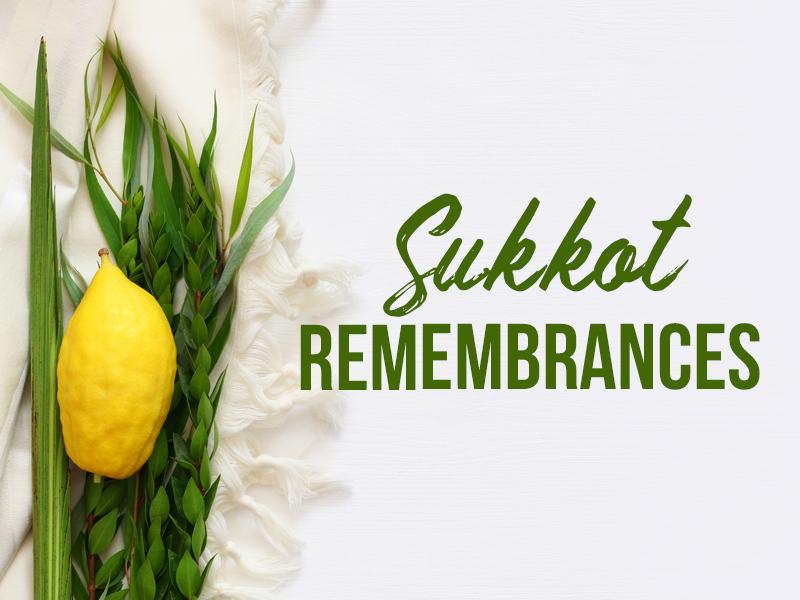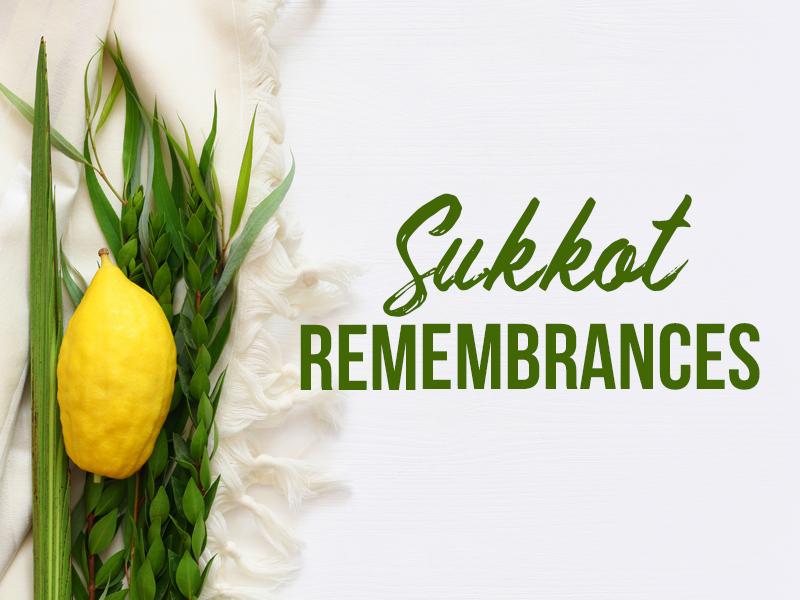
The booths of Sukkot offer us symbols of the fragility and transient nature of life. Tents are temporary, and so are our earthly lives.
This physical world is the only one we’ve known, and though we accept that we’ll someday leave it, life-in-the-moment on planet Earth can feel rather sure. But it really isn’t. Our life could end in any given minute. Besides which, this world won’t last. God is preparing to reveal the New Heaven and New Earth, and this creation will be forgotten (Isaiah 65:17).
Our relationship with God, however, is eternal. Life on Earth is just the beginning of what God has in store for His people. The tents of Sukkot remind us that we shouldn’t get too attached to this world, its pleasures and appearance of security – because only spiritual things last.
“For we know that if the tent, our earthly home, is torn down, we have a building from God – a home not made with human hands, eternal in the heavens.” ––2 Corinthians 5:1
This life is preparing us for eternity. Scripture tells us to invest in the eternal over this Earth. This includes investing in our relationships with God by feasting on His Word and basking in His presence through prayer and worship. It means sowing into other people’s lives with His love and wisdom through acts of kindness, caring and ministry. It means using your gifts to help others and so much more. These are the treasures that can’t be taken away from us.
What really matters in this life? What kind of heavenly treasures might God be calling you to pursue today? For the coming year? Is He inviting you to spend more time with Him in His Word? Is He putting it on your heart to be more mindful of opportunities to minister to others? Determine today to heed His call for an eternal mindset.
“Do not store up for yourselves treasures on earth, where moth and rust destroy and where thieves break in and steal. But store up for yourselves treasures in heaven, where neither moth nor rust destroys and where thieves do not break in or steal.” ––Matthew 6:19–20
Discover the meaning and wonder of Rosh Hashanah, Yom Kippur, and Sukkot with this specially designed infographic.

Remembering Israel’s wilderness days reminds us of how God’s presence dwelled with them during their decades-long wandering. As they roamed the desert, they did so by the guidance of God’s presence represented to them in a pillar of cloud by day and of fire by night. After the tabernacle – a tent – was built, God’s glory resided in the innermost room called the Holy of Holies.
The booths, or tents, of Sukkot depict God’s desire to live in fellowship with His people.
Today, His presence lives within those who have placed their faith in Messiah Yeshua (Jesus). God promised through the prophet Jeremiah that one day, He would write His Law on our hearts (Jeremiah 31:31–32), and the New Covenant explains that when we believe in Yeshua, we receive God’s Holy Spirit to live inside us. (See John 16:5–15.)
“Now it is God who establishes us with you in Messiah. He anointed us, set His seal on us, and gave us the Ruach [Spirit] in our hearts as a pledge.” ––2 Corinthians 1:21–23
It is awe-inspiring to ponder the fact that the holy God of the universe loves us so much that He would want to dwell with us. And through the Holy Spirit, His very presence is within us. He is as close as our silent prayers and always with us. In His presence, all that He is and all that He gives is available to us. By His presence, He comforts and strengthens us. He calms our fears and lifts our spirits. He provides us with a peace that surpasses understanding (Philippians 4:6–7).
Look back and remember a time when you particularly felt God’s presence and how it helped you. Thank Him for the gift of His never-failing presence.
“Why are you in despair, O my soul? And why have you become disturbed within me? Hope in God, for I shall again praise Him for the help of His presence.” ––Psalm 42:5 (NASB)
Discover the meaning and wonder of Rosh Hashanah, Yom Kippur, and Sukkot with this specially designed infographic.
The booths that we build today for Sukkot represent the tents that God had the Israelites live in during their 40-year sojourn in the wilderness. Their tents protected them from the elements and serve as reminders of God’s divine protection of us today.
In the Scriptures, God is shown to be our protector. He has been faithful to Israel throughout history when time and time again, enemies have attempted to annihilate her. She is still here, regathered into the Land God promised to Abraham thousands of years ago. He has supernaturally preserved the Nation of His people against all earthly odds. He said that Israel would always be, and He is true to His Word.
“This is what the Lord says, He who appoints the sun to shine by day, who decrees the moon and stars to shine by night, who stirs up the sea so that its waves roar – the Lord Almighty is His name: ‘Only if these decrees vanish from My sight,’ declares the Lord, ‘will Israel ever cease being a nation before Me.’” ––Jeremiah 31:35–36 (NIV)
This same God is protecting us today. The Psalms are filled with descriptive words revealing God’s protection. He is called a shield, fortress, stronghold, strong tower and more. (See Psalms 3:4, 62:3, 28:8 and 59:10.) The psalmists ran to Him for protection and comfort. In remembering Him, they found strength. No matter how severe a storm we’re going through, we can know God loves us and is ready to receive us into the shelter of His care.
How do God’s faithfulness and comfort strengthen you when you’re facing life’s challenges? Do you find Him to be your “strong tower”? If not, ask Him to help you know the “hiding place” of His love and protection.
“You are my hiding place – You will protect me from distress. You surround me with songs of deliverance.” ––Psalm 32:7
Discover the meaning and wonder of Rosh Hashanah, Yom Kippur, and Sukkot with this specially designed infographic.

God instructs us at Sukkot to remember that He made the Israelites live in tents in the wilderness. Their wandering experience was more complicated than merely living in temporary housing as they traveled. The barren desert offered no food or water for them. They could not have survived it without God’s supernatural provision.
He supplied food out of nowhere with a fresh crop of manna each morning, giving the Children of Israel one day’s nourishment at a time. He provided water from dry rocks to quench their thirst and sustain their lives. He even prevented their clothing and shoes from wearing out despite decades of use. God met their essential needs for 40 years. In remembering this during Sukkot, we celebrate God’s provision for the Israelites of ancient days as well as the ways He takes care of us today.
His divine power has given us everything we need for life and godliness, through knowledge of Him who called us by His own glory and virtue. ––2 Peter 1:3
Many graces of provision go nearly unnoticed in our lives because they are so consistently delivered. We consider many to be guaranteed givens – food, water and clothing among them. The temporary structures of Sukkot remind us what a gift these are. To stop and number our blessings of God’s provision beyond these quickly becomes a list so long we can’t keep track.
As you enjoy this Feast of Sukkot, take time to sit quietly before the Lord. Recount some of the essential gifts He has provided for you. Then, ponder other blessings from His hand that you recognize in your life. Take a few deep and slow breaths, and realize even more graces God has provided for you. And give Him your thanks.
Let us come before His presence with thanksgiving. Let us shout joyfully to Him with songs. ––Psalm 95:2
Discover the meaning and wonder of Rosh Hashanah, Yom Kippur, and Sukkot with this specially designed infographic.